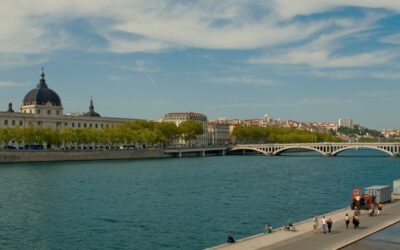Lille Metropole Launches €117 million low-carbon district heating for Tourcoing area • ENGIE Solutions and Lesaffre launch waste heat recovery unit in Marcq-en-Barœl • Last coal powered heating plant in Île-de-France to phase out coal • Read more about the developments in sustainable heating and cooling in this month's news update from France
The Metropolitan Council of Métropole Européenne de Lille have settled on an ambitious prospect for the construction and management of its latest district heating network. The heating will serve the entire municipality of Tourcoing, as well as parts of the municipalities of Bondues, Wattrelos, Neuville-en-Ferrain. The total investments for the project amount to 117 million euros, financed by the responsible concessionaire, who will also receive subsidies from ADEME (the French Environment and Energy Management Agency), and European funds managed by the region. The district heating network will become the seventh in the Lille metropolitan area (MEL, Métropole européende de Lille) and aligns with the metropole’s objectives of offering more affordable, local, and environmental energy to its inhabitants.
The heating is expected to be both cheaper and more stable in terms of pricing compared to collective gas heating, due to its low dependence on fossil fuels. For an average household, the annual bill should be reduced by about 31%. Furthermore, to encourage connection to the heating network, existing buildings situated within 50 meters of the planned network won’t have to pay any connection fees, whereas new buildings within the same distance will have to pay a fee proportional to the connected heating capacity.
The new network is expected to provide 134 GWh of heating per year from 2032, equivalent to 14,000 households. The district heating will be commissioned gradually as it is built, with the first sections coming online as early as 2027 and the final ones planned for completion by the end of 2031, in total more than 46 kilometres of district heating pipes will be laid. The district heating network will serve buildings such as residential properties (including social housing), schools, municipal facilities, businesses and a hospital.
The network will be powered on average by more than 82% renewable and recovered energy, with a guaranteed rate of 83% by 2031. The phase-out of oil and gas heating systems made possible by the network will avoid the emission of 400,000 tonnes of CO2 throughout the duration of the contract (20 years). The recovered energy will be sourced from waste heat from an industrial company and the Neuville-en-Ferrain wastewater treatment plant, whereas the renewable energy will be generated by a biomass boiler plant in Tourcoing.
Read more in article from Métropole Européenne de Lille
In the municipality of Marcq-en-Barœl in the Lille metropolitan area, ENGIE Solutions and Lesaffre, a world leader in the field of fermentation, have inaugurated a new waste heat recovery unit. Two high-power heat pumps allow heat generated by Lesaffre’s fermentation to be reused, which will cover 70% of the industry’s heat needs. The recovery results in the avoidance of 30,000 tonnes of CO₂ emissions and the use of 150.000 m3 each year. The project was initiated in 2022, where ENGIE Solutions were responsible for design, financing and construction and will maintain the operational responsibility of the unit for 15 years.
The main objective of the recovery unit is to recover the heat that the fermentation process of yeast naturally produces. The two heat pumps in the unit have a combined capacity of 19 MWh and are using the recovered heat in the drying process of the yest production. The project received €5.6 million in subsidies from ADEME (the French Environment and Energy Management Agency).
Lesaffre have carried out several projects to use more renewable energy and become more sustainable, where the heat recovery unit is the latest. They have previously installed a biomass power plant at their site in Cérences in Normandy and signed direct renewable energy purchase agreements (CPPA) in 2023 and 2024, for the supply of renewable energy to the company’s production sites in France.
Read more in article from ENGIE Solutions
The last coal powered heating plant in the Île-de-France region (Paris region) is phasing out coal for more sustainable alternatives. The final work to adapt the plant is underway and is expected to be completed by the end of 2026, when the coal in the energy mix will be replaced with reclaimed wood. The refitting of the heating plant aligns with the objectives of the Massy-Antony Inter-Municipal Syndicate for Urban Heating and ADEME (the French Environment and Energy Management Agency). Coal has gradually been phased out of the heating plant since 2015, when it was 100% based on coal. The coal was phased out in favour of biomass and today about 10% of the heating is still based on coal.
To finalise the phase-out, the boiler and storage system that has been used for coal, which provides heating to the equivalent of 26,000 households in the municipalities of Massy and Antony, needs to be adapted to the characteristic differences between coal and wood. The adaptation and final phase-out of coal is expected to avoid the emission of 13,000 to 15,000 tonnes of CO2 annually. The wood will also be regionally sourced, ensuring greater price stability and lower emissions from transports.
The project is subsidised by the Heat Fund set up by the French state, through ADEME, amounting to €7.1 million, covering about 30% of the total cost. “In the Ile-de-France region, building-related heat accounts for nearly two-thirds of energy consumption. The energy transition of these urban heating networks is therefore very important,” says Amélie Renaud, Ademe’s Île-de-France regional director.
Read more in article from Les Echos
To stay updated on news for sustainable heating and cooling, follow us on LinkedIn, and subscribe to our Newsletter.
Sweden is at the forefront of decentralised heat networks technology. Our aim for “Sustainable Heating & Cooling by Sweden” is to facilitate knowledge sharing between British, French and Swedish stakeholders and develop and encourage environmental and economic best practice.
To find out how we can help you and your organisation, please contact our London or Paris-based “SHC” teams. We can introduce you to leading consultants, suppliers of technology and services who will be pleased to share know-how of the development of sustainable heating & cooling solutions.


